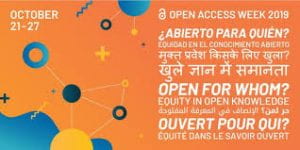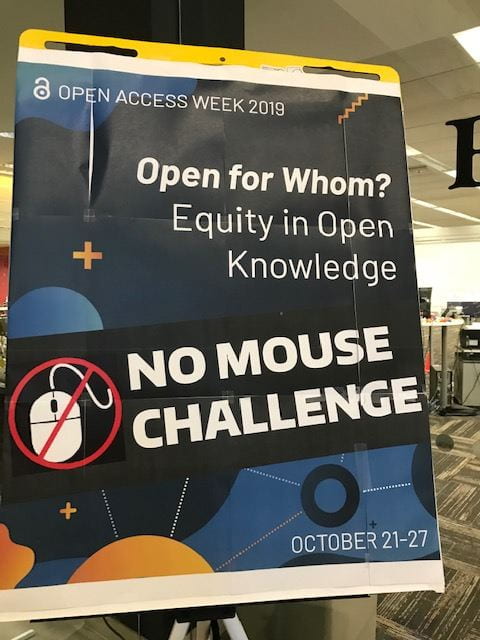October 18, 2019
Top 5 Open Access Resources at UW
At UW Libraries, every week is #OpenAccessWeek
Each October, institutions and individuals around the world celebrate Open Access (OA) Week by highlighting the many benefits of sharing information openly, without legal restrictions or fees. OA is especially important to the academic community where sharing knowledge in an open, timely and accessible way is key to advancing research for the public good. OA policies are spreading on campuses globally, and in May 2018, the UW Faculty Senate adopted an OA Policy. This policy is also informing other efforts to implement more equitable and sustainable models for scholarly publishing in contrast to some publishers’ “big deal” bundles and restrictive contracts.
This year’s OA Week theme, “Open for Whom?,” invites us to consider OA and equity in all forms. This year, UW librarians in Seattle are highlighting OA on campus through accessibility “pop up” events and Creative Commons workshops. Tacoma librarians are hosting two faculty panels to talk about how they share their scholarship openly and lead efforts to adopt open resources in their courses. Meanwhile, Bothell librarians are creating a display to illustrate the financial impact of licensing materials that are not openly available.
Top 5 OA Resources
UW librarians work throughout the year to support students and faculty as they navigate the many resources that facilitate open access. They connect our campus community with a wide range of resources to support openness in teaching, learning and research, including:
- ResearchWorks. The open repository of scholarship by University of Washington faculty and students.
- Guide to Open Resources. This user-centric tool helps faculty and students find openly available resources for research, projects, teaching, or creative fun.
- Guide to Open Educational Resources (OER). OER, particularly open textbooks, save students money while empowering faculty by giving them more control over their course content. This is your source to find and create open textbooks and course materials.
- Guide to the Creative Commons. The OA movement puts its principles into practice by enabling a “digital commons.” Anyone can contribute to it or take what they need from it. If you need images, music, or sounds for a project, search the Creative Commons, a collective source for digital media that can be used immediately at no cost. Need help? Take one of our Creative Commons workshops or ask me!
- Instructor Toolkit. Find out how our UW Librarians can help design and teach lessons on OA resources – or any research topic.
These are just a few of the ways librarians at all three campuses work each day to advance open access discovery and to connect people with knowledge. After all, it’s our mission.
Don’t miss out on these UW Seattle Libraries OA Events:
Accessibility Pop Ups: Learn more about the role accessibility plays in the open creation and dissemination of knowledge. Try the #NoMouseChallenge or see how a screen reader would interact with your favorite website. Stop by our pop up table for an informal chat or to pick up a flyer on campus accessibility resources.
-
- Tuesday, October 22, 12-2pm Husky Union Building
- Wednesday, October 23, 12-2pm Research Commons
Copyright & Creative Commons Licenses: Drop in for a workshop on how the Creative Commons helps creators share and use media without rights headaches. It’s simple and empowering.
-
- Tuesday, October 22, 3-4pm, Research Commons, Green A
- Wednesday, October 23, 3-4pm, Research Commons, Green A
